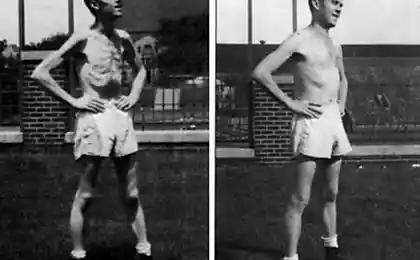645
For the baby there is something much more important than a powerful weight or birth in time!
The most common criterion by which mothers assess the condition of your baby's height and weight. Born 3500 grams and 54 cm – "warrior", and if 2800 grams at once in the eyes of others skips sympathy and words of support, "nothing gain, but the birth went well".
But does it matter how much a child weighs at birth? How will his height and weight on the further development, resistance to disease and psycho-emotional condition?
Neonatologists and pediatricians for years watching the growth and development of children, came to the conclusion that the external signs of the values of weight and height do not give much information about the child. More important physiological maturity.
Thirty three million two hundred forty nine thousand two hundred fifty four
What is physiological maturity
Physiological maturity involves the readiness of the child to independent life outside the mother's body. The concept applies to the assessment of the work of the main systems:
Even a man far removed from science, obviously: the baby grew and developed in harmony, his body should maintain a constant temperature, the lung to exchange oxygen and carbon dioxide blood and the heart to fully saturate the blood to all organs.
Why it is important to evaluate the physiological maturity? To save her from the Mature infants and to help "ripen" for those who have deviation.
The more the baby corresponds to the concept of maturity, the less it will hurt. Proper development of him from the early days – is insurance against infinite virus infections, from allergic reactions to drugs and diathesis.
Criteria for assessment of physiological maturity
To assess the physiological maturity of the infant, doctors use the methods available in any maternity hospital, from the capital to the small town of. They do not require special equipment and complex procedures.
The ability to constantly maintain the same body temperature from 36.6 to 36.8 degrees. Measure the temperature of newborns and infants in the rectum. The specified values are set in the rectum after an hour and a half after birth, after which the little body itself maintains its constancy.
This motor reflexes, which are inherent in the physiologically Mature children. They represent a reaction of the baby to the irritation of various parts of his skin.
If the palm of the baby to put a finger of the adult, so much so, that on this finger the doctor can safely raise a child. Because simultaneously with the contraction of the muscles of the palm there is a strengthening in the overall tone of the body, all skeletal muscles.
The doctor dashed for the movements of the foot skin baby, that is annoying her on the inner edge of the sole. In response to the impact of the infant extends big toe and other toes Flex. At the same time it can be noted that the child bends legs at the knee and hip joints, increases the contractile activity of the other muscles of his body.
If the baby's foot to bend at the hip, it is hardly bent in the knee joint. This is due to the fact that physiologically Mature baby's muscle tone-flexor always dominates the tone of the muscles-extensors.
If a child is put on his tummy and put his palm soles, and he reflexively pushed her away. Creates the effect of a crawl, although the kid stays in place.
The baby, which is vertically raised above the table, holding the mouse, not resting on it. Even if his legs are lower to the table. The child bends legs and draws them towards the tummy.
With moderate pressure on the heel bone of an infant, there is a generalized reaction of the organism in the form of extensor motor activity, cry, and grimace of weeping.
During sleep at the physiologically Mature infants is celebrated on spontaneous locomotor activity. It occurs because of periodic changes in the blood of the baby. Its manifestation is a separate wince handles or jerking of the legs, more with a tendency to extension than to flexion.
Pay attention!
It would seem that the reflexes of the baby is easier to verify during breast-feeding: a child busy, distracted, and reflexes occur independently. The reality is that when feeding the severity of all of the above reflexes is reduced. Therefore, this delayed the test may falsely attribute a physiologically Mature baby immature.
When sucking, you can check only one reflex – sucking: stroking the cheeks of a child leads to increased sucking.
While eating a wince, waving pens and other motor activity of the baby is the absolute norm. Children who are actively moving limb during feeding, the faster they gain weight and grow in length. If the baby diaper tightly to he "scared himself" during a meal, the metabolic processes in his organism and growth is slowing sharply.
Muscle activity that is run and regulated by the nerve centers of the child is the primary factor which determines the further development of the brain, increase brain mass and intellectual development of the baby in later life.
Fifty seven million four hundred thirty nine thousand sixty five
The frequency of breaths in infants who are physiologically Mature, 35-42 is breathing per minute.
The baby's heart alone 135-140 beats per minute. It surprises us the heart rate is the absolute norm for infant age.
Measurement of blood pressure in Mature newborns in the first days after birth shows the values of 80-85 mm Hg.article for high pressure and 45 mm Hg.article for "the bottom".
Physiological immaturity – what is the danger?
Functional immaturity of many vital organs and systems define the characteristics of the course of period of adaptation of the child to the conditions of extrauterine life.
Thirteen million eight hundred four thousand two hundred forty four
Nervous system
At physiologically immature children the process of maturation of neural pathways — formation of the myelin sheath around the nerves and nerve fibers, or myelination, is not yet completed, and therefore violated conduct nerve impulses to various organs and tissues, which affects the viability of their functions. The peripheral nervous system are myelinated enough; bundles of nerve fibers are rare, unevenly distributed. Myelinization in normal continues in the postnatal period, i.e. after birth.
Blood vessels from immature kids can consist of only one inner layer – endothelium and not contain smooth muscle cells, collagen or elastin (especially in case of hypoxia in mothers during pregnancy and deficiency of protein, iron, copper, vitamin C, etc.). That is, not ends with the formation of connective tissue skeleton in the vascular wall, which reduces the resistance to hypoxia and increases the risk of intracranial hemorrhage.
Immature newborns, there is no mechanism of autoregulation of cerebral vessels in connection with the incomplete formation of the fibers of the vessels. In addition, the metabolic activity of endothelial cells depends on the pathways, ensuring the occurrence of oxidation processes and, therefore, there is a high probability of damage during hypoxia.
During childbirth, even uncomplicated, the baby's brain is experiencing a significant load. Pressure on the meninges becomes so strong that it can develop phenomenon spasm, circulatory failure, hemorrhage in the brain. These phenomena are more likely in premature infants and immature children because of the immaturity of brain structures. To determine the degree of immaturity of the CNS and is described by the so-called neurological status of the newborn, which is determined by such factors as: a behavioral condition, muscle tone, motor activity, unconditioned reflexes, response to external stimuli.
With an immature nervous system, reduced motor activity and muscle tone, characterized by weakness and rapid extinction of physiological reflexes. Slow response to stimuli is characterized by a prevalence on the entire body, weakness of active braking, the irradiation of the excitation process, i.e., the irritation of one center spread to another, but on a smaller scale. The immaturity of the cortex leads to the predominance of subcortical activity: chaotic motion, can be observed startle, tremor (shaking) of the hands, clonus stop (twitching of muscles in response to stress), twitching of the eyeballs, transient strabismus.
Respiratory system
In connection with the immaturity of the nervous system and of the system of lipid metabolism derivative which is a surfactant is a surface agent that ensures the disclosure of the lungs during the first breath and their normal functioning in the future, physiologically immature infants often develop respiratory distress syndrome, which manifests with the development of atelectasis. Atelectasis — collapsed sections, or not fully straightened the lung tissue, which are not involved in breathing and may cause respiratory failure.
Such a child is transferred to artificial lung ventilation as long as the respiratory system starts to function by herself. On the background of respiratory distress syndrome often occurs the unification of various infectious diseases (pneumonia), which, of course, worsens the condition of the child.
Cardiovascular system
The structure and operation of the fetal heart prenatal period is different from that of a newborn child. In the fetus the heart is three-chambered, open the holes – "oval window" and "botallov duct" through which the blood mixes in utero and the child gets only "mixed" blood that allows it to be stable enough for a possible lack of oxygen.
After birth there is a rearrangement of the blood circulation and the heart becomes four-chambered and the child begins to obtain pure blood, not mixed blood. Of course, the "holes" are closed not immediately, but "mixing" of the blood through them is not happening already from the first minutes of life.
At the physiologically immature child such rebuilding of the heart is much slower for a long time can not only survive, but to function additional openings and vessels (patent foramen ovale and the ductus botallo).
The pulse of immature newborns is very labile, weak filling, the frequency of 120-160 per minute, but can reach 180. Because the cardiovascular system is immature kids reacts to external stimuli, then you need to try to protect the baby from them, for example, from loud noises.
Circulatory system
In connection with the immaturity of sprouts of the bone marrow, as well as the low sensitivity of bone marrow to EPO (the active hormone of the kidney that stimulates the production of red blood cells) immature children see a lower level of erythrocytes and hemoglobin, which leads to the development of the early anemia physiologically immature children, developing within the first 2 months of life. Quick exhaustion of the white of the germ leads to the development of neutropenia — decrease in the number of neutrophils in the blood, especially in the context of intra - and extrauterine infection of the child.
At physiologically immature newborns with a birth mark lower concentrations of vitamin K, a vitamin K-dependent blood coagulation factors and other disorders in the blood coagulation system. In this situation, the bleeding from the first minutes of life may be associated with thrombosis because of the low activity of fibrinolysis and anticoagulation, which may lead to the development of DIC (disseminated intravascular coagulation).
The process of metabolic adaptation in immature babies slowed down. They have frequent hypoglycemia (decrease of sugar level in the blood), hypoxemia (low oxygen in the blood), hyperbilirubinemia (increased bilirubin in the serum), early anemia in conditions of excess iron.
Digestive system
Digestive system of immature children also has a number of features. First and foremost, this is reflected in the immaturity of the enzyme system. Cancer of the gastrointestinal tract do not produce the right amount of enzymes and gastric juice. When checking gastro-intestinal tract microorganisms, even a small number of pathogenic bacteria, which normally would be neutralized with the help of the protective properties of gastric juice and pancreatic juice, immature children causes phenomena of dysbiosis (abnormal ratios of certain microorganisms in the gastrointestinal tract).
Also, because of the immaturity of the nervous system and nerve impulse transmission suffers from motor (motor) function of the gastrointestinal tract, slows the promotion of food through the gastrointestinal tract. As a result, there are problems with the flow of food in different parts of the stomach and intestine and its excretion.
Feature gastrointestinal tract in a physiologically immature infants are:
Despite the imperfection of the digestive system in physiologically immature infants in the gastric juice is rennet, storagevolume milk. Therefore, mandatory for the immature child is the mother's milk. In addition to its nutritional values, milk provides an invaluable service to protect the kid's body from factors external aggressions. Therefore, even in the case where the child immediately after birth is in the intensive care unit or intensive care and receives parenteral nutrition (through an IV) or is so weak that it can not suckle, you must take all possible measures to preserve breast milk to feed your baby from a spoon. This is one of the essential factors in the nursing of immature infants.
At physiologically immature newborns, the possible functional disability of the liver, it results in inadequate amounts of enzyme glucurono-transferase, and this predisposes to the development of prolonged jaundice. Reduced levels of prothrombin causes increased bleeding.
Immature children are predisposed to bowel dysfunction. The intestinal wall has a high permeability, so the germs and toxins in the intestine, absorbed across the intestinal wall into the blood. Due to the hypotension of the intestine and the anterior abdominal wall often marked by flatulence, as a result, the diaphragm rises up, drawing in the lower parts of the lungs and prevent proper ventilation.
The mucous membrane of the alimentary canal of immature children tender, delicate, easily vulnerable. Low proteolytic activity of gastric juice, insufficient production of pancreatic and intestinal enzymes and bile acids. All this hinders the processes of digestion and absorption, promotes flatulence and dysbiosis. Many immature children, even being breastfed, there is a shortage of bifidoflora of the intestine in combination with the carriage of conditionally pathogenic flora.
The nature of the child's chair is determined by peculiarities of feeding, usually in the coprogram have a physiologically immature children, a lot of neutral fat.
Functional disorders of the gastrointestinal tract represent one of the most common problems among children in the first months of life. A distinctive feature of such States is the appearance of clinical symptoms in the absence of any organic changes in the gastro-intestinal tract (structural abnormalities, inflammatory changes, infections, or tumors), and genetic metabolic disorders.
In functional disorders of the gastrointestinal tract can change motor function, digestion and absorption of nutrients and the composition of the intestinal microbiota and the activity of the immune system. The causes of functional disorders frequently lie outside the affected organ and is caused by violation of nervous and humoral regulation of the digestive tract.
Skeletal system
At physiologically immature children to the birth of the skeletal system is formed, but the bone mineralization is often not yet completed, the additionally required calcium (on the recommendation of a physician).
Premature babies and immature children often have a deficiency of vitamin D, as it was in the last months of pregnancy there is a supply of substances such as vitamin D, calcium, phosphate. If all this is in abundance the mother receives.
Reduced the amount of these substances in the body causes the development of diseases such as rickets, the signs are softening of bones, slowing of growth, especially of the legs, later appearance of the teeth and closing large Fontanelle, changes of the pelvis and hip dysplasia, due to a lack of calcium deformed femur. Physiologically immature children are at risk for the development of this disease. They have it flowing very acute and progresses rapidly. Therefore, the physiologically immature children are often prescribed vitamin D to prevent rickets.
It happens that the physiologically immature children are born with unformed hips. Dysplasia (underdevelopment) of the joints facing in the future, subluxation, dislocation and deprivation of the ability to move independently. It is therefore necessary to diagnose the disease and prescribe treatment. For the detection of dysplasia ultrasound examination of the joints, which allows the correct diagnosis.
Common cause of dysplasia – deficiency in mothers during pregnancy of magnesium, iron, protein, vitamin C and other nutritional factors.
Endocrine system
Peculiarities of functioning of endocrine system of an immature child is dependent on the presence of endocrine disorders in the mother. As a rule, the coordination of the activities of the endocrine glands is disturbed.
Immature children relative to the reduced reserve capacity of the thyroid gland, in connection with which they may develop transient hypothyroidism (a condition of a temporary reduction in the level of thyroid hormones accompanied by increased levels of TSH in the blood).
Fourteen million three hundred seventy six thousand one hundred ninety five
Urogenital system
Water and mineral metabolism at physiologically immature newborns labile, so the children are equally predisposed to the formation of oedema and development of dehydration (dehydration).
Early swelling develops in utero or in the first hours and days after birth. In the pathogenesis of edema in addition to renal factors plays a significant role hypoproteinemia, which is important in maintaining oncotic pressure of plasma. Clinically, edema is expressed early in the soft infiltration of tissues (from a total pastoznost to massive generalized edema that does not have a specific localization). They disappear within 1-2 weeks after birth.
Late swelling appear after 2-3 weeks after birth, characterized by a specific localization on the thighs, legs, feet, pubes, and lower part of the abdomen. They are dense to the touch, with smooth, shiny, non-flexible skin. The appearance of edema due to the nature of feeding, illnesses of the child or with severe hypoproteinemia (low protein in the blood).
Immune system
The immune system is physiologically immature child is already able to give an answer when meeting with alien microorganisms, but also this response can occur inappropriately, violently, or, conversely, with delayed reaction.
In subsequent stages of child development have an increased allergic reaction of the organism, such children there are various types of diathesis.
There is also a reduced ability to produce substances that protect the mucous membranes, so infection is easier compared to full-term a child damage these shells, causing focal infection.
High sensitivity to viral infections. They in 60-80% of cases occur in oligosymptomatic variant.
The thermoregulatory system
At physiologically immature children are extremely imperfect. This is due to several reasons: first of all, immaturity of the Central regulatory mechanisms of heat transfer (i.e., hypothalamus), as well as anatomical and physiological characteristics of these children. The body temperature is subjected to cooling and overheating, depending on the temperature of the external environment.
Excessive warming of the physiologically immature child leads to overheating, due to the imperfections of the thermoregulatory center. At the same time, they have no adequate increase in body temperature on infection process. Overheating also contributes to the underdevelopment of the sweat glands.
Physiological maturity or immaturity – the phenomenon irreversible?
Even fully healthy, physiologically Mature baby may lose physiological maturity, if it is incorrectly arranged care, are not met appropriate hygiene procedures.
Sixty three million two hundred forty thousand nine hundred ninety two
You need baby to keep their physiological maturity, as well as what is needed for those children who were rated as "immature"?
Maximum adherence, appropriate to the needs and rhythms of a newborn!You can't ignore the early and regular latch the baby to breast, even when the application of the child is bottle-fed. The bond between mother and baby helps him to better adapt to the new environment. The later started breastfeeding, the worse for the baby. Delay of feeding for 2-4 days from the moment of birth of a child can have a negative impact: a child recognized at birth, a physiologically Mature, will show signs of physiological immaturity.
For moms whose child is born physiologically Mature it is important to have good nutrition on all ingredients: protein, carbohydrate, saturated and polyunsaturated fats, vitamins, minerals. You need to enrich your diet with vitamin-mineral complexes, highly digestible proteins (meat, fish, cheese, eggs), offal, vegetables, fruits, berries, moderate quantity of boiled cereals (rice, buckwheat).
It is not necessary to eat more often than 4 times a day and drink tea with milk 20 minutes before feeding or after feeding. Enough to drink a few SIPS of water before feeding the child, and to quench the thirst when needed, but not sweet drinks. Prohibited carbonated beverages, especially Cola-type drinks.
Important often stay with the baby's mother, petting, playing with the baby, gentle words with the first birthdays. But sleep the baby in her crib or in the stroller in the fresh air (as often as possible).
You need to regularly put the baby to your breast, even in the absence of breastfeeding. In this case, the baby should hold the mouth the nipple of the breast no less than ten minutes, after which he can offer the bottle.
The air temperature in the room should be:
At an ambient temperature of about 32 degrees Celsius the motor activity of the baby is virtually zero, what is the harm, and not caring.
Often immature kids administered therapeutic massage. But doing it should only be a specialist. Mom needs to learn the rules of stroking, gentle massage for newborns.
The physiological maturity of the baby right during pregnancy
For the harmonious development of the baby and timely ripening of all its systems, you should pay maximum attention to the stages of preparation for pregnancy and the first weeks of pregnancy.
Sixty three million five hundred twenty one thousand nine hundred forty one
This is the time when the impact on the fetus of drugs, alcohol, nicotine and other substances is especially dangerous. This is the time when any nervous mom's stress affects the processes occurring with the baby. Hunger mom, even hidden hunger in the form of deep deficiency of important nutritional factors (amino acids, b vitamins, iron, oxygen, iodine, polyunsaturated fatty acids class omega-3, etc.) can also be the cause of physiological immaturity of the baby.
Also interesting: Troubleshooting problems during pregnancy without medication
Fitness and pregnancy
Tune in a positive pregnancy. Make sure that no teratogenic effect in each tablet, which is going to swallow each product is eaten or drunk a glass of liquid, cream, toothpaste, procedure cleanser.
Pregnancy lasts only nine months. Therefore, the "victim" by refusing a glass of wine, beauty treatments or a long flight is nothing compared to the healthy baby, ready for life in the new world.published
Source: www.sethealth.ru/2016/10/04/%D0%B4%D0%BB%D1%8F-%D0%BD%D0%BE%D0%B2%D0%BE%D1%80%D0%BE%D0%B6%D0%B4%D0%B5%D0%BD%D0%BD%D0%BE%D0%B3%D0%BE-%D0%B5%D1%81%D1%82%D1%8C-%D1%87%D1%82%D0%BE-%D1%82%D0%BE-%D0%B3%D0%BE%D1%80%D0%B0%D0%B7%D0%B4-2/
But does it matter how much a child weighs at birth? How will his height and weight on the further development, resistance to disease and psycho-emotional condition?
Neonatologists and pediatricians for years watching the growth and development of children, came to the conclusion that the external signs of the values of weight and height do not give much information about the child. More important physiological maturity.
Thirty three million two hundred forty nine thousand two hundred fifty four
What is physiological maturity
Physiological maturity involves the readiness of the child to independent life outside the mother's body. The concept applies to the assessment of the work of the main systems:
- nervous,
- cardiovascular,
- musculoskeletal,
- respiratory.
Even a man far removed from science, obviously: the baby grew and developed in harmony, his body should maintain a constant temperature, the lung to exchange oxygen and carbon dioxide blood and the heart to fully saturate the blood to all organs.
Why it is important to evaluate the physiological maturity? To save her from the Mature infants and to help "ripen" for those who have deviation.
The more the baby corresponds to the concept of maturity, the less it will hurt. Proper development of him from the early days – is insurance against infinite virus infections, from allergic reactions to drugs and diathesis.
Criteria for assessment of physiological maturity
To assess the physiological maturity of the infant, doctors use the methods available in any maternity hospital, from the capital to the small town of. They do not require special equipment and complex procedures.
- Thermoregulation
The ability to constantly maintain the same body temperature from 36.6 to 36.8 degrees. Measure the temperature of newborns and infants in the rectum. The specified values are set in the rectum after an hour and a half after birth, after which the little body itself maintains its constancy.
- Skeletal muscle reflexes
This motor reflexes, which are inherent in the physiologically Mature children. They represent a reaction of the baby to the irritation of various parts of his skin.
- Reflex Robinson or "grasping" reflex
If the palm of the baby to put a finger of the adult, so much so, that on this finger the doctor can safely raise a child. Because simultaneously with the contraction of the muscles of the palm there is a strengthening in the overall tone of the body, all skeletal muscles.
- Plantar reflex
The doctor dashed for the movements of the foot skin baby, that is annoying her on the inner edge of the sole. In response to the impact of the infant extends big toe and other toes Flex. At the same time it can be noted that the child bends legs at the knee and hip joints, increases the contractile activity of the other muscles of his body.
- Difficulty straightening the leg at the knee
If the baby's foot to bend at the hip, it is hardly bent in the knee joint. This is due to the fact that physiologically Mature baby's muscle tone-flexor always dominates the tone of the muscles-extensors.
- «Crawl»
If a child is put on his tummy and put his palm soles, and he reflexively pushed her away. Creates the effect of a crawl, although the kid stays in place.
- A negative reaction to the prop
The baby, which is vertically raised above the table, holding the mouse, not resting on it. Even if his legs are lower to the table. The child bends legs and draws them towards the tummy.
- The calcaneal reflex or reflex Arshavsky
With moderate pressure on the heel bone of an infant, there is a generalized reaction of the organism in the form of extensor motor activity, cry, and grimace of weeping.
- General motor activity of the baby
During sleep at the physiologically Mature infants is celebrated on spontaneous locomotor activity. It occurs because of periodic changes in the blood of the baby. Its manifestation is a separate wince handles or jerking of the legs, more with a tendency to extension than to flexion.
Pay attention!
It would seem that the reflexes of the baby is easier to verify during breast-feeding: a child busy, distracted, and reflexes occur independently. The reality is that when feeding the severity of all of the above reflexes is reduced. Therefore, this delayed the test may falsely attribute a physiologically Mature baby immature.
When sucking, you can check only one reflex – sucking: stroking the cheeks of a child leads to increased sucking.
While eating a wince, waving pens and other motor activity of the baby is the absolute norm. Children who are actively moving limb during feeding, the faster they gain weight and grow in length. If the baby diaper tightly to he "scared himself" during a meal, the metabolic processes in his organism and growth is slowing sharply.
Muscle activity that is run and regulated by the nerve centers of the child is the primary factor which determines the further development of the brain, increase brain mass and intellectual development of the baby in later life.
Fifty seven million four hundred thirty nine thousand sixty five
- Respiration rate
The frequency of breaths in infants who are physiologically Mature, 35-42 is breathing per minute.
- Heart rate
The baby's heart alone 135-140 beats per minute. It surprises us the heart rate is the absolute norm for infant age.
- Blood pressure
Measurement of blood pressure in Mature newborns in the first days after birth shows the values of 80-85 mm Hg.article for high pressure and 45 mm Hg.article for "the bottom".
Physiological immaturity – what is the danger?
Functional immaturity of many vital organs and systems define the characteristics of the course of period of adaptation of the child to the conditions of extrauterine life.
Thirteen million eight hundred four thousand two hundred forty four
Nervous system
At physiologically immature children the process of maturation of neural pathways — formation of the myelin sheath around the nerves and nerve fibers, or myelination, is not yet completed, and therefore violated conduct nerve impulses to various organs and tissues, which affects the viability of their functions. The peripheral nervous system are myelinated enough; bundles of nerve fibers are rare, unevenly distributed. Myelinization in normal continues in the postnatal period, i.e. after birth.
Blood vessels from immature kids can consist of only one inner layer – endothelium and not contain smooth muscle cells, collagen or elastin (especially in case of hypoxia in mothers during pregnancy and deficiency of protein, iron, copper, vitamin C, etc.). That is, not ends with the formation of connective tissue skeleton in the vascular wall, which reduces the resistance to hypoxia and increases the risk of intracranial hemorrhage.
Immature newborns, there is no mechanism of autoregulation of cerebral vessels in connection with the incomplete formation of the fibers of the vessels. In addition, the metabolic activity of endothelial cells depends on the pathways, ensuring the occurrence of oxidation processes and, therefore, there is a high probability of damage during hypoxia.
During childbirth, even uncomplicated, the baby's brain is experiencing a significant load. Pressure on the meninges becomes so strong that it can develop phenomenon spasm, circulatory failure, hemorrhage in the brain. These phenomena are more likely in premature infants and immature children because of the immaturity of brain structures. To determine the degree of immaturity of the CNS and is described by the so-called neurological status of the newborn, which is determined by such factors as: a behavioral condition, muscle tone, motor activity, unconditioned reflexes, response to external stimuli.
With an immature nervous system, reduced motor activity and muscle tone, characterized by weakness and rapid extinction of physiological reflexes. Slow response to stimuli is characterized by a prevalence on the entire body, weakness of active braking, the irradiation of the excitation process, i.e., the irritation of one center spread to another, but on a smaller scale. The immaturity of the cortex leads to the predominance of subcortical activity: chaotic motion, can be observed startle, tremor (shaking) of the hands, clonus stop (twitching of muscles in response to stress), twitching of the eyeballs, transient strabismus.
Respiratory system
In connection with the immaturity of the nervous system and of the system of lipid metabolism derivative which is a surfactant is a surface agent that ensures the disclosure of the lungs during the first breath and their normal functioning in the future, physiologically immature infants often develop respiratory distress syndrome, which manifests with the development of atelectasis. Atelectasis — collapsed sections, or not fully straightened the lung tissue, which are not involved in breathing and may cause respiratory failure.
Such a child is transferred to artificial lung ventilation as long as the respiratory system starts to function by herself. On the background of respiratory distress syndrome often occurs the unification of various infectious diseases (pneumonia), which, of course, worsens the condition of the child.
Cardiovascular system
The structure and operation of the fetal heart prenatal period is different from that of a newborn child. In the fetus the heart is three-chambered, open the holes – "oval window" and "botallov duct" through which the blood mixes in utero and the child gets only "mixed" blood that allows it to be stable enough for a possible lack of oxygen.
After birth there is a rearrangement of the blood circulation and the heart becomes four-chambered and the child begins to obtain pure blood, not mixed blood. Of course, the "holes" are closed not immediately, but "mixing" of the blood through them is not happening already from the first minutes of life.
At the physiologically immature child such rebuilding of the heart is much slower for a long time can not only survive, but to function additional openings and vessels (patent foramen ovale and the ductus botallo).
The pulse of immature newborns is very labile, weak filling, the frequency of 120-160 per minute, but can reach 180. Because the cardiovascular system is immature kids reacts to external stimuli, then you need to try to protect the baby from them, for example, from loud noises.
Circulatory system
In connection with the immaturity of sprouts of the bone marrow, as well as the low sensitivity of bone marrow to EPO (the active hormone of the kidney that stimulates the production of red blood cells) immature children see a lower level of erythrocytes and hemoglobin, which leads to the development of the early anemia physiologically immature children, developing within the first 2 months of life. Quick exhaustion of the white of the germ leads to the development of neutropenia — decrease in the number of neutrophils in the blood, especially in the context of intra - and extrauterine infection of the child.
At physiologically immature newborns with a birth mark lower concentrations of vitamin K, a vitamin K-dependent blood coagulation factors and other disorders in the blood coagulation system. In this situation, the bleeding from the first minutes of life may be associated with thrombosis because of the low activity of fibrinolysis and anticoagulation, which may lead to the development of DIC (disseminated intravascular coagulation).
The process of metabolic adaptation in immature babies slowed down. They have frequent hypoglycemia (decrease of sugar level in the blood), hypoxemia (low oxygen in the blood), hyperbilirubinemia (increased bilirubin in the serum), early anemia in conditions of excess iron.
Digestive system
Digestive system of immature children also has a number of features. First and foremost, this is reflected in the immaturity of the enzyme system. Cancer of the gastrointestinal tract do not produce the right amount of enzymes and gastric juice. When checking gastro-intestinal tract microorganisms, even a small number of pathogenic bacteria, which normally would be neutralized with the help of the protective properties of gastric juice and pancreatic juice, immature children causes phenomena of dysbiosis (abnormal ratios of certain microorganisms in the gastrointestinal tract).
Also, because of the immaturity of the nervous system and nerve impulse transmission suffers from motor (motor) function of the gastrointestinal tract, slows the promotion of food through the gastrointestinal tract. As a result, there are problems with the flow of food in different parts of the stomach and intestine and its excretion.
Feature gastrointestinal tract in a physiologically immature infants are:
- weakness of sphincter, the entrance to the stomach that causes frequent regurgitation;
- poor development of the longitudinal muscle bundles of stomach wall, resulting in lethargy and bloating it in the overfed and the ingress of air;
- slow evacuation of stomach contents (130-140 min.);
- high viscosity of the original feces.
Despite the imperfection of the digestive system in physiologically immature infants in the gastric juice is rennet, storagevolume milk. Therefore, mandatory for the immature child is the mother's milk. In addition to its nutritional values, milk provides an invaluable service to protect the kid's body from factors external aggressions. Therefore, even in the case where the child immediately after birth is in the intensive care unit or intensive care and receives parenteral nutrition (through an IV) or is so weak that it can not suckle, you must take all possible measures to preserve breast milk to feed your baby from a spoon. This is one of the essential factors in the nursing of immature infants.
At physiologically immature newborns, the possible functional disability of the liver, it results in inadequate amounts of enzyme glucurono-transferase, and this predisposes to the development of prolonged jaundice. Reduced levels of prothrombin causes increased bleeding.
Immature children are predisposed to bowel dysfunction. The intestinal wall has a high permeability, so the germs and toxins in the intestine, absorbed across the intestinal wall into the blood. Due to the hypotension of the intestine and the anterior abdominal wall often marked by flatulence, as a result, the diaphragm rises up, drawing in the lower parts of the lungs and prevent proper ventilation.
The mucous membrane of the alimentary canal of immature children tender, delicate, easily vulnerable. Low proteolytic activity of gastric juice, insufficient production of pancreatic and intestinal enzymes and bile acids. All this hinders the processes of digestion and absorption, promotes flatulence and dysbiosis. Many immature children, even being breastfed, there is a shortage of bifidoflora of the intestine in combination with the carriage of conditionally pathogenic flora.
The nature of the child's chair is determined by peculiarities of feeding, usually in the coprogram have a physiologically immature children, a lot of neutral fat.
Functional disorders of the gastrointestinal tract represent one of the most common problems among children in the first months of life. A distinctive feature of such States is the appearance of clinical symptoms in the absence of any organic changes in the gastro-intestinal tract (structural abnormalities, inflammatory changes, infections, or tumors), and genetic metabolic disorders.
In functional disorders of the gastrointestinal tract can change motor function, digestion and absorption of nutrients and the composition of the intestinal microbiota and the activity of the immune system. The causes of functional disorders frequently lie outside the affected organ and is caused by violation of nervous and humoral regulation of the digestive tract.
Skeletal system
At physiologically immature children to the birth of the skeletal system is formed, but the bone mineralization is often not yet completed, the additionally required calcium (on the recommendation of a physician).
Premature babies and immature children often have a deficiency of vitamin D, as it was in the last months of pregnancy there is a supply of substances such as vitamin D, calcium, phosphate. If all this is in abundance the mother receives.
Reduced the amount of these substances in the body causes the development of diseases such as rickets, the signs are softening of bones, slowing of growth, especially of the legs, later appearance of the teeth and closing large Fontanelle, changes of the pelvis and hip dysplasia, due to a lack of calcium deformed femur. Physiologically immature children are at risk for the development of this disease. They have it flowing very acute and progresses rapidly. Therefore, the physiologically immature children are often prescribed vitamin D to prevent rickets.
It happens that the physiologically immature children are born with unformed hips. Dysplasia (underdevelopment) of the joints facing in the future, subluxation, dislocation and deprivation of the ability to move independently. It is therefore necessary to diagnose the disease and prescribe treatment. For the detection of dysplasia ultrasound examination of the joints, which allows the correct diagnosis.
Common cause of dysplasia – deficiency in mothers during pregnancy of magnesium, iron, protein, vitamin C and other nutritional factors.
Endocrine system
Peculiarities of functioning of endocrine system of an immature child is dependent on the presence of endocrine disorders in the mother. As a rule, the coordination of the activities of the endocrine glands is disturbed.
Immature children relative to the reduced reserve capacity of the thyroid gland, in connection with which they may develop transient hypothyroidism (a condition of a temporary reduction in the level of thyroid hormones accompanied by increased levels of TSH in the blood).
Fourteen million three hundred seventy six thousand one hundred ninety five
Urogenital system
Water and mineral metabolism at physiologically immature newborns labile, so the children are equally predisposed to the formation of oedema and development of dehydration (dehydration).
Early swelling develops in utero or in the first hours and days after birth. In the pathogenesis of edema in addition to renal factors plays a significant role hypoproteinemia, which is important in maintaining oncotic pressure of plasma. Clinically, edema is expressed early in the soft infiltration of tissues (from a total pastoznost to massive generalized edema that does not have a specific localization). They disappear within 1-2 weeks after birth.
Late swelling appear after 2-3 weeks after birth, characterized by a specific localization on the thighs, legs, feet, pubes, and lower part of the abdomen. They are dense to the touch, with smooth, shiny, non-flexible skin. The appearance of edema due to the nature of feeding, illnesses of the child or with severe hypoproteinemia (low protein in the blood).
Immune system
The immune system is physiologically immature child is already able to give an answer when meeting with alien microorganisms, but also this response can occur inappropriately, violently, or, conversely, with delayed reaction.
In subsequent stages of child development have an increased allergic reaction of the organism, such children there are various types of diathesis.
There is also a reduced ability to produce substances that protect the mucous membranes, so infection is easier compared to full-term a child damage these shells, causing focal infection.
High sensitivity to viral infections. They in 60-80% of cases occur in oligosymptomatic variant.
The thermoregulatory system
At physiologically immature children are extremely imperfect. This is due to several reasons: first of all, immaturity of the Central regulatory mechanisms of heat transfer (i.e., hypothalamus), as well as anatomical and physiological characteristics of these children. The body temperature is subjected to cooling and overheating, depending on the temperature of the external environment.
Excessive warming of the physiologically immature child leads to overheating, due to the imperfections of the thermoregulatory center. At the same time, they have no adequate increase in body temperature on infection process. Overheating also contributes to the underdevelopment of the sweat glands.
Physiological maturity or immaturity – the phenomenon irreversible?
Even fully healthy, physiologically Mature baby may lose physiological maturity, if it is incorrectly arranged care, are not met appropriate hygiene procedures.
Sixty three million two hundred forty thousand nine hundred ninety two
You need baby to keep their physiological maturity, as well as what is needed for those children who were rated as "immature"?
Maximum adherence, appropriate to the needs and rhythms of a newborn!You can't ignore the early and regular latch the baby to breast, even when the application of the child is bottle-fed. The bond between mother and baby helps him to better adapt to the new environment. The later started breastfeeding, the worse for the baby. Delay of feeding for 2-4 days from the moment of birth of a child can have a negative impact: a child recognized at birth, a physiologically Mature, will show signs of physiological immaturity.
For moms whose child is born physiologically Mature it is important to have good nutrition on all ingredients: protein, carbohydrate, saturated and polyunsaturated fats, vitamins, minerals. You need to enrich your diet with vitamin-mineral complexes, highly digestible proteins (meat, fish, cheese, eggs), offal, vegetables, fruits, berries, moderate quantity of boiled cereals (rice, buckwheat).
It is not necessary to eat more often than 4 times a day and drink tea with milk 20 minutes before feeding or after feeding. Enough to drink a few SIPS of water before feeding the child, and to quench the thirst when needed, but not sweet drinks. Prohibited carbonated beverages, especially Cola-type drinks.
Important often stay with the baby's mother, petting, playing with the baby, gentle words with the first birthdays. But sleep the baby in her crib or in the stroller in the fresh air (as often as possible).
You need to regularly put the baby to your breast, even in the absence of breastfeeding. In this case, the baby should hold the mouth the nipple of the breast no less than ten minutes, after which he can offer the bottle.
The air temperature in the room should be:
- from 18 to 20 degrees during wakefulness (this temperature stimulates motor activity),
- from 20 to 22 degrees Celsius during sleep.
At an ambient temperature of about 32 degrees Celsius the motor activity of the baby is virtually zero, what is the harm, and not caring.
Often immature kids administered therapeutic massage. But doing it should only be a specialist. Mom needs to learn the rules of stroking, gentle massage for newborns.
The physiological maturity of the baby right during pregnancy
For the harmonious development of the baby and timely ripening of all its systems, you should pay maximum attention to the stages of preparation for pregnancy and the first weeks of pregnancy.
Sixty three million five hundred twenty one thousand nine hundred forty one
This is the time when the impact on the fetus of drugs, alcohol, nicotine and other substances is especially dangerous. This is the time when any nervous mom's stress affects the processes occurring with the baby. Hunger mom, even hidden hunger in the form of deep deficiency of important nutritional factors (amino acids, b vitamins, iron, oxygen, iodine, polyunsaturated fatty acids class omega-3, etc.) can also be the cause of physiological immaturity of the baby.
Also interesting: Troubleshooting problems during pregnancy without medication
Fitness and pregnancy
Tune in a positive pregnancy. Make sure that no teratogenic effect in each tablet, which is going to swallow each product is eaten or drunk a glass of liquid, cream, toothpaste, procedure cleanser.
Pregnancy lasts only nine months. Therefore, the "victim" by refusing a glass of wine, beauty treatments or a long flight is nothing compared to the healthy baby, ready for life in the new world.published
Source: www.sethealth.ru/2016/10/04/%D0%B4%D0%BB%D1%8F-%D0%BD%D0%BE%D0%B2%D0%BE%D1%80%D0%BE%D0%B6%D0%B4%D0%B5%D0%BD%D0%BD%D0%BE%D0%B3%D0%BE-%D0%B5%D1%81%D1%82%D1%8C-%D1%87%D1%82%D0%BE-%D1%82%D0%BE-%D0%B3%D0%BE%D1%80%D0%B0%D0%B7%D0%B4-2/























